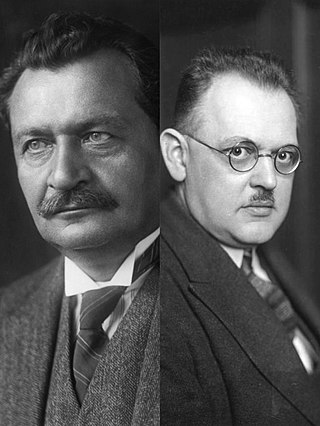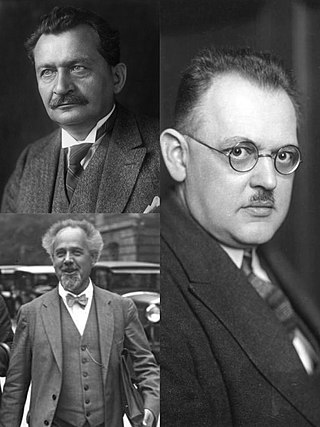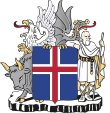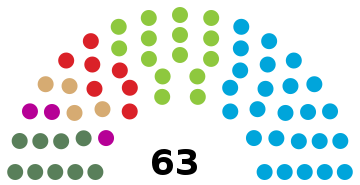
Bulgaria elects on the national level a head of state—the president—and a legislature. The president is elected for a five-year term directly by the people. The National Assembly has 240 members elected for a four-year term by proportional representation in multi-seat constituencies with a 4% threshold. Bulgaria has a multi-party system in which often no one party has a chance of gaining power alone and parties must work with each to form governments.

Federal elections were held in Germany on 6 June 1920. Territorial disputes meant that voting was delayed in East Prussia and Schleswig-Holstein until 20 February 1921, and until 19 November 1922 in Oppeln. The Social Democratic Party remained the largest party in the Reichstag although it lost over a third of its seats. Voter turnout was about 79.2%.

Federal elections were held in Germany on 4 May 1924, after the Reichstag had been dissolved on 13 March. The Social Democratic Party remained the largest party, winning 100 of the 472 seats. Voter turnout was 77.4%.

Parliamentary elections were held in Montenegro on 20 October 2002. The result was a victory for the For a European Montenegro alliance formed by the Democratic Party of Socialists (DPS) and the Social Democratic Party (SDP), which won 39 of the 75 seats. It was the last parliamentary election held in Montenegro prior to independence referendum in 2006.
Constitutional Assembly elections were held in the newly-independent Republic of Montenegro on 10 September 2006. Prime Minister Milo Đukanović's Coalition for a European Montenegro won a majority in Parliament, winning 41 of the 81 seats. The opposition blocs together won 34 seats; 12 for the Serb List (SL) and 11 each for the Socialist People's Party (SNP)-led list and the Movement for Changes (PzP). Other seats were won by parties representing national minorities. As the opposition conceded defeat, DPS leader Đukanović stated "These elections showed that Montenegro is stable and firm on its European path."
Parliamentary elections were held in Iceland on 10 May 2003. The Independence Party remained the largest party in the Althing, winning 22 of the 63 seats. The coalition government of the Independence Party and Progressive Party remained in office, with Davíð Oddsson continuing as Prime Minister.
Parliamentary elections were held in Iceland on 30 June 1946. The Independence Party remained the largest party in the Lower House of the Althing, winning 13 of the 35 seats.
Parliamentary elections were held in Iceland on 23 and 24 October 1949. The Independence Party remained the largest party in the Lower House of the Althing, winning 13 of the 35 seats.
Parliamentary elections were held in Iceland on 28 June 1953. The Independence Party remained the largest party in the Lower House of the Althing, winning 14 of the 35 seats.
Parliamentary elections were held in Iceland on 24 June 1956. The Independence Party remained the largest party in the Lower House of the Althing, winning 13 of the 35 seats.
Parliamentary elections were held in Iceland on 28 June 1959. The Independence Party and the Progressive Party both won 13 seats in the Lower House of the Althing. Following the tie, electoral reforms were introduced and early elections were held in October.
Early parliamentary elections were held in Iceland on 25 and 26 October 1959. Following the electoral reforms made after the June elections, the Independence Party won 16 of the 40 seats in the Lower House of the Althing.
Parliamentary elections were held in Iceland on 25 April 1987. The Independence Party remained the largest party in the Lower House of the Althing, winning 12 of the 42 seats.
Elections to the Supreme Soviet were held in the Estonian SSR on 18 March 1990. Altogether 392 candidates ran for the Soviet-style legislature's 105 seats, of which four were pre-allocated to the military districts of the Soviet Army. The pro-independence Popular Front won the plurality. The coalition of the reformed Estonian communists, who favored independence but close relations with the USSR and were supported by Indrek Toome who was running under the Free Estonia banner, won 27 seats. The anti-independence, pro-Moscow "Joint Soviet of Work Collectives", representing mostly the ethnic Russian immigrant minority in Estonia, won 25 seats. During its first session, the new legislature elected the former Communist Party member Arnold Rüütel as its chairman, allowing him to stay as the nominal leader of Estonia.

Parliamentary elections were held in Hungary between 31 March and 7 April 1935. The result was a victory for the Party of National Unity, which won 164 of the 245 seats in Parliament. Gyula Gömbös remained Prime Minister.
Parliamentary elections were held in Iceland on 27 October 1923. Voters elected all 28 seats in the Lower House of the Althing and eight of the fourteen seats in Upper House. The Citizens' Party, a loose collection of conservatives, emerged as the largest party in the Lower House, winning 16 of the 28 seats.
Parliamentary elections were held in Iceland on 24 June 1934. They were the first held after reforms to the electoral system that increased the number of seats in the Lower House from 28 to 33 and ensured that all members of the Althing were elected at the same election. The Independence Party emerged as the largest party in the Lower House, winning 14 of the 33 seats.
Parliamentary elections were held in Iceland on 5 July 1942. Although the Independence Party won a plurality of votes, the Progressive Party remained as the largest party in the Lower House of the Althing, winning 14 of the 33 seats.
Early parliamentary elections were held in Iceland on 18 and 19 October 1942. They were held after reforms were made to the electoral system following the July elections. The Independence Party emerged as the largest party in the Lower House of the Althing, winning 13 of the 35 seats.

Federal elections were held in Switzerland on 27 October 1872. The Radical Left remained the largest group in the National Council.







